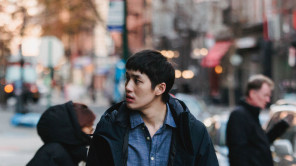Wong Kar-wai hasn’t directed a film in eight years, but the Hong Kong maestro has just done the next-best thing, having produced a film by a young protégé that’s both swooningly beautiful and honestly affecting in its account of some young emotional searchers. Director Baz Poonpiriya has made two previous films, the second of which, Bad Genius, became the most successful Thai production ever throughout Asia four years ago, and while his style has clearly been amply influenced by the works of his producer, he’s also delivered a palpably personal and involving story of thwarted love, long-distance longing and incipient mortality.
Ping-ponging half-way around the globe between its settings on the roads of Thailand and the streets of New York, this gorgeous work is an account of young love/lust mixed with hindsight poignance, as well as a consideration of the variable fruits of trying to make amends for past mistakes. As such it is abundantly emotional and, not infrequently, wryly amusing, as a young man stricken with leukemia tracks down numerous women in the hope of tidying up loose ends before departing his mortal coil.
Related Story
Sundance Review: ‘Summer Of Soul (…Or, When The Revolution Could Not Be Televised)’
This is a deep-dish movie-movie, one that’s constantly trading in matters of love desired, won and lost, of regret, of shimmers of hope. It’s a road movie of streets and highways, catchy pop music and emotions worthy of a symphony orchestra. Not so many films these days stir the pot with so many ingredients, but this one simmers throughout with percolating feelings that aren’t all that common in films these days.
While the film does a tricky balancing act all the way through of juggling disparate moments in time and space, the dramatic framework is quickly set with the news that thirtyish Aood (Ice Natara) has been diagnosed with leukemia. He calls his former best friend Boss (Tor Thanapob) to come to Thailand from New York to do him a favor. Although the two have been estranged and out of touch for some time, Boss doesn’t hesitate for a second and, upon arrival, is informed that his pal wants him to drive on a road trip through the country from north to south so that he can make amends with numerous women before he departs this world.
One can easily imagine such a set-up done Hollywood-style done years ago, with Neil Simon writing and Gene Saks directing Jack Lemmon and Walter Matthau as a bickering old twosome resurrecting old disputes and settling old scores as they visit old ladies they once lusted after or were married to. It scarcely needs to be said that this new film could scarcely be more different. When the dashingly handsome Boss arrives, he’s struck by Aood’s bald scalp and frail physique; the young man is done with chemo, his prospects implicitly grim. With a very eclectic music collection as backdrop, they hit the road.

Sundance
The first stop is a film shoot wedding, where a former ladyfriend of Aood (pronounced “owed”) is playing the bride. She wants absolutely nothing to do with him. By contrast, in Chiang Mai, he has a sweet encounter with a former flame and her little daughter. And so it goes down the map, as the past begins to become filled in and the drama’s attention decisively shifts to Boss and his history.
The man is not ill-named. He’s so handsome and unneedy that he gets any woman he wants, and as a popular barman his opportunities are limitless. Having more trouble securing a footing in Gotham is Prim (Violet Wautier), a vibrant and game young lady from Thailand trying to give Gotham a go. It’s difficult at first, but she proves herself a cocktail whiz nonpareil and captures Boss’ attention as no other woman ever has.
The New York section of the film is jammed with scenes of a thriving downtown nightlife of a kind absent from modern life for nearly a year. It also gives Wautier, in particular, a real chance to shine. The camera loves her and her vibrant personality and quicksilver mood changeability suggest a lively career in the making. Cinematographer Phaklao Jiraungkoonkun makes the most of the abundant visual opportunities on locations on both sides of the world, and the lush visuals owe a certain debut to the influence of the film’s producer.
But an equal factor in the film’s effectiveness stems from the acutely judged editing. The film jumps around a good deal, in both locations and time periods, and while the chronology may not always be entirely clear, the emotional through-lines remain strongly felt, allowing for unbroken attachment and concern for the central characters, all of whom eventually achieve real dimensionality.
From the beginning, Aood’s medical condition drapes the film in sense of life’s evanescence, the potential for anything to be here one day and gone the next. Despite or because of this, One for the Road remains vitally alive at every moment, alert to every emotion, desire, opportunity and vicissitude churned up by the characters’ journeys. It’s kind of a knock-out.
One for the Road is playing in the World Drama section of the Sundance Film Festival. World premiere. Running time: 136 minutes. Sales agent: CAA.






